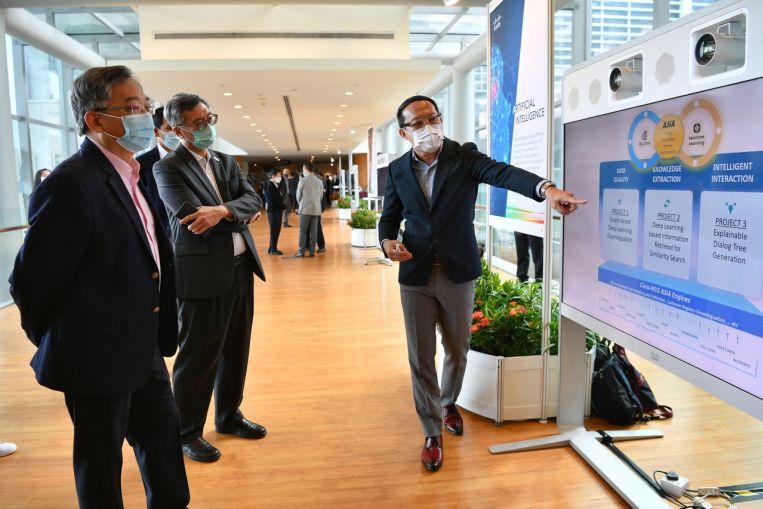SINGAPORE – Singapore’s digitalisation drive has moved up another gear, with two new research initiatives worth $174 million over five years.
One effort involves a research laboratory under United States tech firm Cisco and the National University of Singapore (NUS), with an investment of $54 million.
The other initiative links up tech, defence and engineering company ST Engineering with four partners and has a $120 million investment.
Speaking at the launch of the Cisco-NUS lab on Friday (Nov 5), Trade and Industry Minister Gan Kim Yong said: “Partnerships between companies continue to be an effective way to spur innovation and reimagine new business models.”
He also encouraged more firms to follow Cisco’s example to work with the Government.
The new Accelerated Digital Economy Corporate Laboratory will boost research into artificial intelligence, healthcare, cyber security, urban infrastructure and workplace productivity.
Supported by the National Research Foundation, it aims to develop 17 tech solutions, as well as 12 products and services.
Mr Gan said these cutting-edge technologies can be accessed by companies looking to digitally transform their businesses and compete more effectively.
This is in line with Singapore’s $25 billion Research, Innovation and Enterprise 2025 Plan, he added.
He said the new lab – based in NUS’ Kent Ridge campus – can help strengthen the country’s innovation capabilities.
It will create more than 20 research and development jobs, as well as training opportunities for almost 100 researchers, analysts, engineers and students.
It is expected to partner at least 100 Singapore-based companies to customise and refine solutions according to their requirements. This can allow local firms to be involved in and learn from the research and development process.
It also paves the way for them to tap productivity improvements, revenue growth or cost savings through innovation, said Mr Gan.
The AI research that the lab will delve into includes developing algorithms to upgrade the extracting and making sense of data collected in the workplace, such as interactions with Cisco customers to create customer service chatbots.
In healthcare, the lab is working with Singapore General Hospital to look into collecting and analysing the data of patients over secure wireless networks.

This could, for instance, be used to monitor Covid-19 patients in the emergency department by using radio-frequency identification tags. If they enter areas they are not supposed to, healthcare workers can locate them quickly and figure out who they came into close contact with for contact tracing.
For urban infrastructure, the lab aims to simulate and analyse road traffic, which could be useful for developing transport policies.
Data collected from cameras and sensors installed at lamp posts could, for example, help researchers understand how cyclists and motorists react to one another on the road.
ST Engineering announced last Thursday (Oct 28) that it is working with NUS, Nanyang Technological University (NTU), Singapore University of Technology and Design (SUTD) and the Agency for Science, Technology and Research to speed up the commercialisation of tech research via industry applications.
Dubbed Research Translation @ ST Engineering, the initiative will look into areas such as smart traffic management, 5G mobile, energy tech and cyber security.

It will also conduct research in robotics and autonomous buses, quantum computing which improves processing speeds, digitalisation and data analytics, as well as neuromorphic computing in which computer elements are modelled after the human brain.
The partnership will involve up to 100 researchers and about 200 ST Engineering scientists and engineers, with 20 to 30 research projects expected to be worked on at any one time.
The outcomes of the research will be adopted by ST Engineering for its commercial and defence businesses in the aerospace, smart city and public security areas.

The company is working with SUTD on cyber security research to develop a “post quantum encryptor” that can provide an extra layer of security to thwart hacking and ensure information sent is secure. This could be useful in national defence and organisations that deal with classified data.
With NTU, ST Engineering is looking to offer fast-charging solutions for electric vehicles.
The firm is also tying up with NUS to work on smart traffic management systems using AI.













































